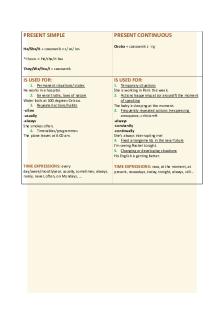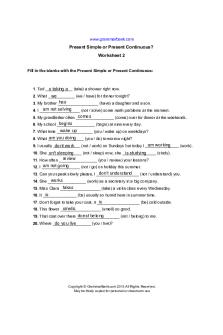Unit 1. Verb tenses. Present simple and continuous PDF

| Title | Unit 1. Verb tenses. Present simple and continuous |
|---|---|
| Course | Inglés |
| Institution | Universidad Pontificia de Salamanca |
| Pages | 6 |
| File Size | 138.3 KB |
| File Type | |
| Total Downloads | 79 |
| Total Views | 143 |
Summary
upsa...
Description
INGLÉS INSTRUMENTAL UNIT 1. VERB TENSES. PRESENT SIMPLE AND CONTINUOUS
PRESENT SIMPLE Affirmative
Negative
Interrogative
I want
I do not (don’t) want
Do I want?
He/she/it wants
He/she/it does not (doesn’t) w ant
Does he/she/it want?
We/you/they want
We/you/they do not (don’t) want
Do we/you/they want?
Spelling of the third person singular:
- Most verbs add -s: Work → works Start → starts - Verbs ending in –s/-ss/-sh/-ch/-x add -es. Miss → misses Wash → washes Note also: Go → goes Do → does - Verbs ending in -y, change -y to –ie when we add -s. Hurry → hurries Study → studies USES
Use the present simple for:
- things that are always true or happen regularly. I usually go away at weekends. (something happens repeatedly) The café opens at 7.30 in the morning. (something happens repeatedly) Nurses look after patients in hospital. (something is true in general) The earth goes around the sun. (something is true in general) - permanent situations. They work in a bank. My parents live in London. They have lived there all their lives. UNIT 1. VERBS TENSES. PRESENT SIMPLE AND CONTINUOUS
1
PRESENT CONTINUOUS
Affirmative
Negative
Interrogative
I am studying
I am not (I’m not) studying
am I studying?
He/she/it is studying
He/she/it is not (isn’t) studying
is he/she/it studying?
We/you/they are studying We/you/they are not (aren’t) studying are we/you/they studying?
Spelling of the -ing form: - Most verbs add -ing: Work → working Start → starting Visit → visiting - Verbs ending in -e. We normally leave out -e when we add -ing to a verb that ends in -e. Take → taking Drive → driving But we keep e before -ing with the verb to be and verbs that end in -ee. Be → being See → seeing Agree → agreeing - When a verb ends in -ie , it changes -ie to -y when we add -ing. Die → dying Lie → lying - Sometimes we double a final consonant. This happens when a one-syllable verb ends with one vowel and one consonant. Shop → shopping Plan → planning If the verb has more than one syllable, we double the consonant at the end only if the final syllable is stressed. Prefer → preferring Regret → regretting Permit → permi tting Begin → begi nning In British English, verbs ending in -l have -ll before -ing whether the final syllable is stressed or not. Travel → travelling
UNIT 1. VERBS TENSES. PRESENT SIMPLE AND CONTINUOUS
2
USE
We use the present continuous for:
- actions in progress at the time of speaking. It is often used with 'now, at the moment, currently, today, this week, this year, etc. Please don’t make so much noise. I’m trying to work. He’s studying very hard today.
- temporary actions; that is actions that are going on around now but not at the actual moment of speaking. I’m reading a really good book at the moment. (but perhaps she isn’t reading the book at the time of speaking)
- for future arrangements. We're getting married in October. They’re meeting at 10.00. She’s leaving on Friday. ACTION AND NON-ACTION VERBS
- Verbs which describe actions, e.g. make, cook, can be used in the present simple or continuous. - Verbs which describe states or feelings (not actions), e.g. like, want, are not normally used in the present continuous. Common non-action verbs are agree, believe, belong, depend, forget, hate, hear, know, like, love, matter, mean, need, prefer, realize, recognize, seem, suppose, understand, or want. I’m hungry. I want to eat something. Do you understand what I mean? Ann doesn’t seem very happy at the moment.
A few verbs have an action and non-action meaning. The most common is have. I have a big flat. = possession (non-action) I can’t talk now. I’m having lunch. = an activity (action)
UNIT 1. VERBS TENSES. PRESENT SIMPLE AND CONTINUOUS
3
EXERCISES
a. Correct the mistakes in the highlighted phrases. E.g. Ouch! You stand on my foot! → You’re standing 1. They have always breakfast in bed on a Sunday morning. 2. She can’t come to the phone now. She has a shower. 3. We are needing an answer from you before Wednesday. 4. I’m studying a lot now because I have exams next week. 5. She don’t eat meat at all. 6. They always are late. 7. Do you go out tonight? 8. He never replys to my emails! 9. A: Are you going to the park this afternoon? B: I don’t know. It’s depending on the weather.
b. Write questions in the present continuous or present simple. E.g. A: What are you eating ? (you/eat) B: A cheese sandwich.
1. A: Where __________ lunch today? (you/have) B: At home. My mum’s making pasta. 2. A: What __________? (he/do) B: He’s an accountant. 3. A: __________ this weekend? (you/go away) B: No, we’re staying here. 4. A: __________ to eat out tonight? (you/want) B: Yes, that would be nice. Where shall we go? 5. A: What __________? (she/cook) B: I don’t know but it smells good. c. Choose the correct form of the verbs.
Noemi: What do you study/are you studying ? Victor: Political Science. Noemi: I do/I’m doing Social Anthropology. Where do you come/are you coming from? UNIT 1. VERBS TENSES. PRESENT SIMPLE AND CONTINUOUS
4
Victor: I’m from Coimbra, in Portugal. Noemi: How many hours of classes do you have/are you having a day? Victor: It depends/It’s depending on the day, but usually four. Do you go/are you going to the party tonight? Noemi: Do you mean/are you meaning the one for new students? I can’t, because I need/I’m needing to get organized tonight. I move/I’m moving to a rented flat tomorrow. Victor: Where do you live/are you living at the moment? Noemi: I stay/I’m staying in a bed and breakfast. Victor: What do you do/are you doing on Sunday afternoon? If you want/are wanting, we could meet and look around the city. Noemi: I meet/I’m meeting some friends in the afternoon. What about Sunday morning? Victor: Fine. Where shall we meet?
d. Complete the dialogues with the correct form of the verbs: present simple or present continuous.
Driver: So, What _________________ (do) here in Chicago, mister? Man:
I _________________ (visit) some clients.
Driver: Where are you from? You _________________ (not mind) me asking, do you? Man:
Not at all. From Inchon, in Korea.
Driver: Good place to be! Me, I’m from Idaho. How long _________________ (stay) here? Man:
Three days. I _________________ (go) home on Saturday.
Driver: OK. Hey, _________________ (like) steak? _________________ (know) where the best steak in all of America _________________ (come) from? That’s right – Idaho!
Policeman: What _________________ (do) here? Josh:
Nothing. Why?
Policeman: We ask the questions here. Josh:
We _________________(wait) for someone.
Policeman: Where _________________ (live)? Josh:
151 Churchill Road.
Policeman: What are your names?
UNIT 1. VERBS TENSES. PRESENT SIMPLE AND CONTINUOUS
5
Josh:
I’m Josh and he’s my brother, Wayne. We _________________ (not do) anything illegal, are we?
Policeman: _________________ (carry) any form of identification? Josh:
Yes.
I
_________________
(have)
my
driving
licence.
_________________(want) to see it? Here! Policeman: It _________________ (say) Dean Allen on this licence. Josh:
Does it? Oh, yes, it’s my dad’s.
UNIT 1. VERBS TENSES. PRESENT SIMPLE AND CONTINUOUS
6...
Similar Free PDFs
Popular Institutions
- Tinajero National High School - Annex
- Politeknik Caltex Riau
- Yokohama City University
- SGT University
- University of Al-Qadisiyah
- Divine Word College of Vigan
- Techniek College Rotterdam
- Universidade de Santiago
- Universiti Teknologi MARA Cawangan Johor Kampus Pasir Gudang
- Poltekkes Kemenkes Yogyakarta
- Baguio City National High School
- Colegio san marcos
- preparatoria uno
- Centro de Bachillerato Tecnológico Industrial y de Servicios No. 107
- Dalian Maritime University
- Quang Trung Secondary School
- Colegio Tecnológico en Informática
- Corporación Regional de Educación Superior
- Grupo CEDVA
- Dar Al Uloom University
- Centro de Estudios Preuniversitarios de la Universidad Nacional de Ingeniería
- 上智大学
- Aakash International School, Nuna Majara
- San Felipe Neri Catholic School
- Kang Chiao International School - New Taipei City
- Misamis Occidental National High School
- Institución Educativa Escuela Normal Juan Ladrilleros
- Kolehiyo ng Pantukan
- Batanes State College
- Instituto Continental
- Sekolah Menengah Kejuruan Kesehatan Kaltara (Tarakan)
- Colegio de La Inmaculada Concepcion - Cebu















